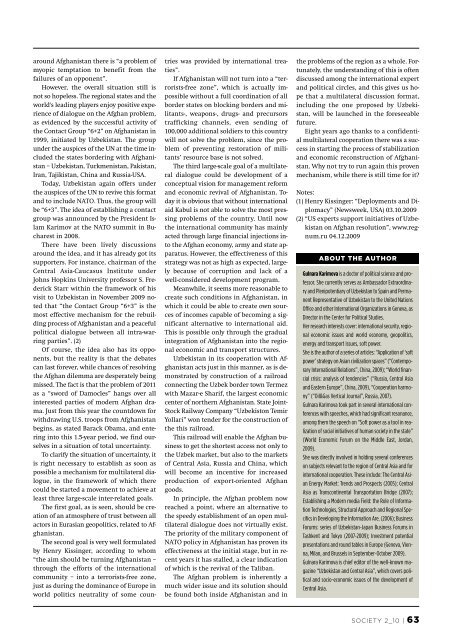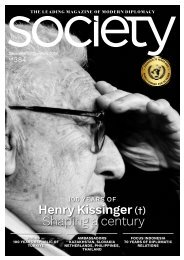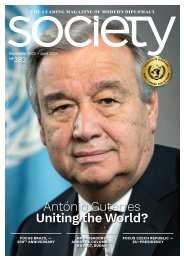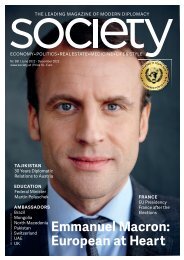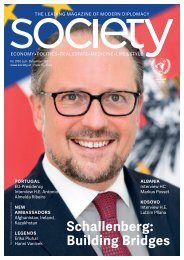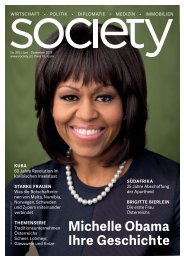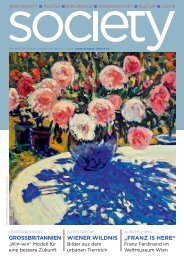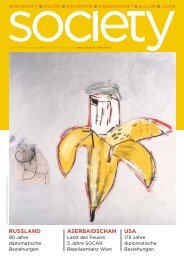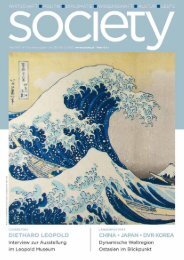SOCIETY 354 /2010
Sie wollen auch ein ePaper? Erhöhen Sie die Reichweite Ihrer Titel.
YUMPU macht aus Druck-PDFs automatisch weboptimierte ePaper, die Google liebt.
around Afghanistan there is “a problem of<br />
myopic temptation to benefit from the<br />
failures of an opponent”.<br />
However, the overall situation still is<br />
not so hopeless. The regional states and the<br />
world's leading players enjoy positive experience<br />
of dialogue on the Afghan problem,<br />
as evidenced by the successful activity of<br />
the Contact Group “6+2” on Afghanistan in<br />
1999, initiated by Uzbekistan. The group<br />
under the auspices of the UN at the time included<br />
the states bordering with Afghanistan<br />
– Uzbekistan, Turkmenistan, Pakistan,<br />
Iran, Tajikistan, China and Russia-USA.<br />
Today, Uzbekistan again offers under<br />
the auspices of the UN to revive this format<br />
and to include NATO. Thus, the group will<br />
be “6+3”. The idea of establishing a contact<br />
group was announced by the President Islam<br />
Karimov at the NATO summit in Bucharest<br />
in 2008.<br />
There have been lively discussions<br />
around the idea, and it has already got its<br />
supporters. For instance, chairman of the<br />
Central Asia-Caucasus Institute under<br />
Johns Hopkins University professor S. Frederick<br />
Starr within the framework of his<br />
visit to Uzbekistan in November 2009 noted<br />
that “the Contact Group “6+3” is the<br />
most effective mechanism for the rebuilding<br />
process of Afghanistan and a peaceful<br />
political dialogue between all intra-warring<br />
parties”. (2)<br />
Of course, the idea also has its opponents,<br />
but the reality is that the debates<br />
can last forever, while chances of resolving<br />
the Afghan dilemma are desperately being<br />
missed. The fact is that the problem of 2011<br />
as a “sword of Damocles” hangs over all<br />
interested parties of modern Afghan drama.<br />
Just from this year the countdown for<br />
withdrawing U.S. troops from Afghanistan<br />
begins, as stated Barack Obama, and entering<br />
into this 1.5-year period, we find ourselves<br />
in a situation of total uncertainty.<br />
To clarify the situation of uncertainty, it<br />
is right necessary to establish as soon as<br />
possible a mechanism for multilateral dialogue,<br />
in the framework of which there<br />
could be started a movement to achieve at<br />
least three large-scale inter-related goals.<br />
The first goal, as is seen, should be creation<br />
of an atmosphere of trust between all<br />
actors in Eurasian geopolitics, related to Afghanistan.<br />
The second goal is very well formulated<br />
by Henry Kissinger, according to whom<br />
“the aim should be turning Afghanistan –<br />
through the efforts of the international<br />
community – into a terrorists-free zone,<br />
just as during the dominance of Europe in<br />
world politics neutrality of some countries<br />
was provided by international treaties”.<br />
If Afghanistan will not turn into a “terrorists-free<br />
zone”, which is actually impossible<br />
without a full coordination of all<br />
border states on blocking borders and militants-,<br />
weapons-, drugs- and precursors<br />
trafficking channels, even sending of<br />
100,000 additional soldiers to this country<br />
will not solve the problem, since the problem<br />
of preventing restoration of militants’<br />
resource base is not solved.<br />
The third large-scale goal of a multilateral<br />
dialogue could be development of a<br />
conceptual vision for management reform<br />
and economic revival of Afghanistan. Today<br />
it is obvious that without international<br />
aid Kabul is not able to solve the most pressing<br />
problems of the country. Until now<br />
the international community has mainly<br />
acted through large financial injections into<br />
the Afghan economy, army and state apparatus.<br />
However, the effectiveness of this<br />
strategy was not as high as expected, largely<br />
because of corruption and lack of a<br />
well-considered development program.<br />
Meanwhile, it seems more reasonable to<br />
create such conditions in Afghanistan, in<br />
which it could be able to create own sources<br />
of incomes capable of becoming a significant<br />
alternative to international aid.<br />
This is possible only through the gradual<br />
integration of Afghanistan into the regional<br />
economic and transport structures.<br />
Uzbekistan in its cooperation with Afghanistan<br />
acts just in this manner, as is demonstrated<br />
by construction of a railroad<br />
connecting the Uzbek border town Termez<br />
with Mazar-e Sharif, the largest economic<br />
center of northern Afghanistan. State Joint-<br />
Stock Railway Company “Uzbekiston Temir<br />
Yollari” won tender for the construction of<br />
the this railroad.<br />
This railroad will enable the Afghan business<br />
to get the shortest access not only to<br />
the Uzbek market, but also to the markets<br />
of Central Asia, Russia and China, which<br />
will become an incentive for increased<br />
production of export-oriented Afghan<br />
goods.<br />
In principle, the Afghan problem now<br />
reached a point, where an alternative to<br />
the speedy establishment of an open multilateral<br />
dialogue does not virtually exist.<br />
The priority of the military component of<br />
NATO policy in Afghanistan has proven its<br />
effectiveness at the initial stage, but in recent<br />
years it has stalled, a clear indication<br />
of which is the revival of the Taliban.<br />
The Afghan problem is inherently a<br />
much wider issue and its solution should<br />
be found both inside Afghanistan and in<br />
the problems of the region as a whole. Fortunately,<br />
the understanding of this is often<br />
discussed among the international expert<br />
and political circles, and this gives us hope<br />
that a multilateral discussion format,<br />
including the one proposed by Uzbekistan,<br />
will be launched in the foreseeable<br />
future.<br />
Eight years ago thanks to a confidential<br />
multilateral cooperation there was a success<br />
in starting the process of stabilization<br />
and economic reconstruction of Afghanistan.<br />
Why not try to run again this proven<br />
mechanism, while there is still time for it?<br />
Notes:<br />
(1) Henry Kissinger: “Deployments and Diplomacy”<br />
(Newsweek, USA) 03.10.2009<br />
(2) “US experts support initiatives of Uzbekistan<br />
on Afghan resolution”, www.regnum.ru<br />
04.12.2009<br />
ABOUT THE AUTHOR<br />
Gulnara Karimova is a doctor of political science and professor.<br />
She currently serves as Ambassador Extraordinary<br />
and Plenipotentiary of Uzbekistan to Spain and Permanent<br />
Representative of Uzbekistan to the United Nations<br />
Office and other International Organizations in Geneva, as<br />
Director in the Center for Political Studies.<br />
Her research interests cover: international security, regional<br />
economic issues and world economy, geopolitics,<br />
energy and transport issues, soft power.<br />
She is the author of a series of articles: “Application of ‘soft<br />
power’ strategy on Asian civilization spaces” (“Contemporary<br />
International Relations”, China, 2009); “World financial<br />
crisis: analysis of tendencies” (“Russia, Central Asia<br />
and Eastern Europe”, China, 2009), “Cooperation harmony”<br />
(“Oil&Gas Vertical Journal”, Russia, 2007).<br />
Gulnara Karimova took part in several international conferences<br />
with speeches, which had significant resonance,<br />
among them the speech on “Soft power as a tool in realization<br />
of social initiatives of human society in the state”<br />
(World Economic Forum on the Middle East, Jordan,<br />
2009).<br />
She was directly involved in holding several conferences<br />
on subjects relevant to the region of Central Asia and for<br />
international cooperation. These include: The Central Asian<br />
Energy Market: Trends and Prospects (2005); Central<br />
Asia as Transcontinental Transportation Bridge (2007);<br />
Establishing a Modern media Field: the Role of Information<br />
Technologies, Structural Approach and Regional Specifics<br />
in Developing the Information Are. (2006); Business<br />
Forums: series of Uzbekistan-Japan Business Forums in<br />
Tashkent and Tokyo (2007-2009); Investment potential<br />
presentations and round tables in Europe (Geneva, Vienna,<br />
Milan, and Brussels in September-October 2009).<br />
Gulnara Karimova is chief editor of the well-known magazine<br />
“Uzbekistan and Central Asia”, which covers political<br />
and socio-economic issues of the development of<br />
Central Asia.<br />
<strong>SOCIETY</strong> 2_10 | 63


